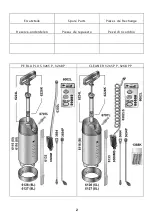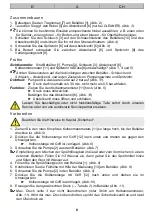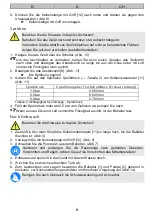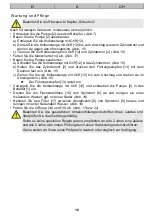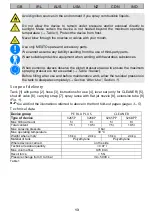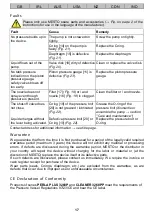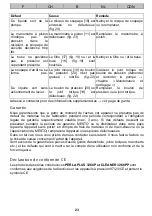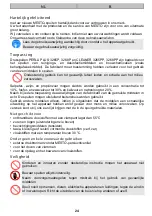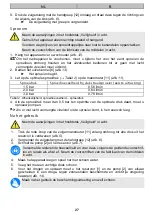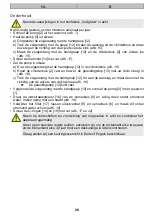
GB
IRL
AUS
USA
NZ
CDN
IND
14
As s embly
1. Fasten the carrying strap [7] on the tank [1]
(Fig. 2)
.
2. If required, replace the lever [5] on the shut-off valve [6] (only for CLEANER)
(Fig. 3)
.
For determined applications you can select corresponding levers, e. g. a red lever for
sanitary cleaner, a green lever for floor cleaner, and a blue lever for surface cleaner.
3. Slip the hose [3] on the hose socket of the tank [10] and of the shut-off valve [6] and
secure it with the union nuts.
(Fig. 4)
4. Screw the spray lance [8] onto the shut-off valve [6]
(Fig. 4)
5. If required, screw the extension tube [9] between shut-off valve [6] and spray lance [8].
C hecks
Visual inspection:
Check that tank [1], pump [2], hose [3], shut-off valve [6], piston
pressure gauge [11] and spray lance with tube [8] are undamaged.
(Figures 1, 4, 5)
Pay special attention to the connections between the tank – hose and the hose – shut-
off valve and to the condition of the pump threading and spray lance.
No leaks:
Pump up the empty device to 2 bar.
(Fig. 11)
►
The pressure must not decrease more than 0.5 bar within 30 minutes.
Function:
Pull up the piston pressure gauge [11]
(Fig. 5)
.
►
The pressure must dissipate.
Activate the shut-off valve [6]
(Fig. 13)
.
►
The shut-off valve must open and close.
Have damaged parts or parts that do not work properly repaired immediately by our
customer service department or by service partners authorized by us.
Making preparations
Observe the instructions in the section entitled “Safety”.
1. Pull up the red button on the piston pressure gauge [11] until all excess pressure is
released from the tank.
(Fig. 5)
2. Press the piston rod with handle [12] down and turn it counterclockwise.
►
The piston rod with handle is locked.
(Fig. 6)
3. Unscrew the pump [2] from the tank.
(Fig. 7)
We recommend you mix the spraying liquid in the device or premix it in an external
tank: Fill to 1/3 with water, pour in the spraying agent, and then add more water until
full.
4. Add the spraying liquid to the tank [1]
(Fig. 8)
.
5. Check the filling level with the scale [13] on the tank
(Fig. 8)
.
6. Screw the pump [2] into the tank
(Fig. 9)
.
7. Press the piston rod with handle [12] down and turn it clockwise.
►
The piston rod with handle is unlocked
(Fig. 10)
.
8. Create the desired pressure (
→
Table 2
)
in the tank
(Fig. 11)
.
The maximum pressure should not exceed 3 bar (red line on the piston pressure gauge,
Fig. 11). If the maximum pressure is exceeded, the safety valve will engage and
release the excess pressure.
9. Press the piston rod with handle [12] down and turn it counterclockwise
(Fig. 6).
►
The piston rod with handle is locked.


